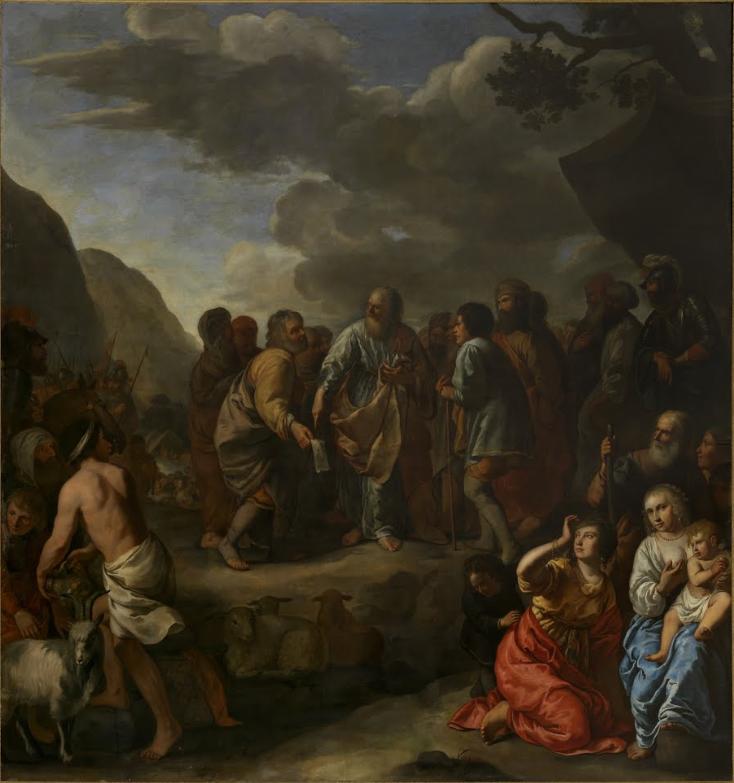
Parashat Yitro
♦
Parashat Yitro
Bernadette Chellew
24 January 2019
According to the Women’s Commentary, this parashah is divided into four sections. The first section is Jethro’s advice to Moses (18:1-27). This parashah, named after Jethro, Moses’ father-in-law, focuses this section on a priest of Midian – a non-Israelite. He brings back Zipporah and Moses’ two sons who are said to have been sent away, though we saw them in Ex 4:24-26. Jethro had heard of the great deeds that the Lord had done in Egypt and how the Lord had brought the people out of slavery. Because of this, Jethro declares to Moses that he now knows that “the Lord is greater that all Gods” (v. 11). He then brought a burnt offering and sacrifices for God, and Aaron and all the elders of Israel partook of the meal in God’s presence with the priest of Midian.
The following day Jethro observed how Moses was wearing himself out by sitting all day listening to the disputes and other inquiries made by the people seeking advice from God. The people were also worn out with waiting. The priest of Midian advises Moses on how to share his workload. He suggests that suitable men be appointed as chiefs “sarim” over thousands, hundreds, fifties and tens – a “judicial system” which is “hierarchical and quasi-military”. Only serious matters were to be brought to Moses.
The second section concerns the preparation of the people for the Covenant and Divine Revelation (19:1-25). The people enter the wilderness of Sinai and they encamp in front of the mountain.
The Lord’s first message, through Moses, is a wonderful revelation to the people: “I bore you on eagles’ wings and brought you to Me. Now then, if you obey Me faithfully and keep My covenant, you shall be My treasured possession among all peoples. Indeed, the earth is Mine, but you shall be to Me a kingdom of priests and a holy nation.” (19:4-6) Moses is told to speak these words to the people. When Moses gave the message to the people, they answered: “All that the Lord has spoken, we will do.” (v. 8)
The third section is “The Decalogue” (20:1-14). Whatever happened on the mountain; whatever the people heard; and how the “Ten Words” (Deca-logos) were given to Moses have been explored by scholars over the years. I would like to subscribe to what Plaut quotes as Rosenzwieg’s point of view. He says that no matter what we take into account concerning the Theophany: “All the people themselves experience immediately and not through mediation, was God’s overwhelming presence, which caused them to accept God as the demanding force in their lives” (Plaut: 2006, p. 487).
Fourthly, the people’s response and the first instruction are recorded in 20:15-23. The overwhelming presence which the people felt caused great fear in them: awe of the holiness and magnificence of God. Moses assures them that they have nothing to fear from God as long as they keep the Covenant and do not leave the path set out for them.
For Reflection and Discussion: In Verbum Domini, Benedict XVI gives a section titled: “The Bible, a great Code for Cultures”. How do you think this applies to our Parashah?
Bibliography: Benedict XVI. Verbum Domini (Nairobi: 2010); Eskenazi, T. C. Weiss, A.L. A Women’s Commentary (New York: 2008); Plaut. The Torah, a Modern Commentary (New York: 2006)

Jethro advising Moses
Jan Gerritsz van Bronckhorst 1659
Moses is standing in the centre and gesturing with his hand to a piece of paper inscribed with laws. At this point of the Bible story, the people of Israel were setting off on their long trek through the desert towards the Promised Land. Jethro, Moses’ father-in-law, advised Moses to lay down laws and appoint judges. He also advised him to delegate some of his judicial responsibilities to other wise men. In the bottom right-hand corner, Jethro and his wife are starting out on the journey back to their own country, accompanied by Moses’ wife and his two sons.
Source: Google Arts & Culture

This week’s teaching commentary is by
Bernadette Chellew, BA, B.Ed (hons);
Durban, South Africa. Bat Kol alum 2008
PLEASE NOTE: The weekly Parashah commentaries represent the research and creative thought of their authors, and are meant to stimulate deeper thinking about the meaning of the Scriptures. While they draw upon the study methods and sources employed by the ISPS-Ratisbonne, the views and conclusions expressed in these commentaries are solely those of their authors, and do not necessarily represent the views of ISPS-Ratisbonne. The commentaries, along with all materials published on the ISPS-Ratisbonne website, are copyrighted by the writers, and are made available for personal and group study, and local church purposes. Permission needed for other purposes. Questions, comments and feedback are always welcome.
Share this with your friends
Institute Saint Pierre de Sion – Ratisbonne – Christian Center for Jewish Studies
Congregation of the Religious of Our Lady of Sion
Contact us:
secretary@ratisbonne.org.il
26 Shmuel Ha-Naguid Street – Jerusalem
Subscribe to Newsletter

No responses yet